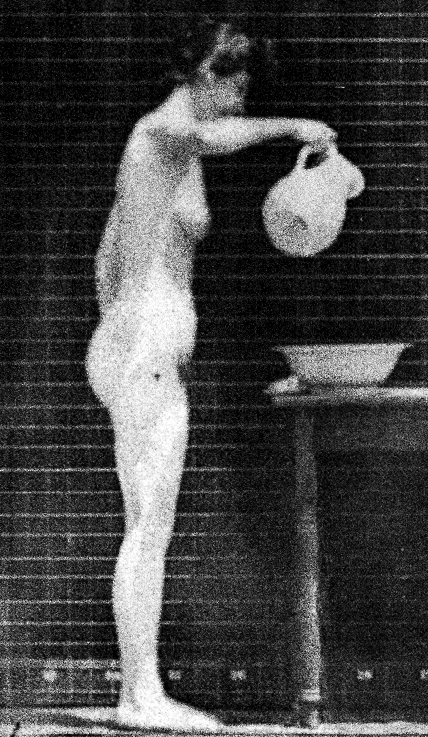Clean
Fantasies of disembodiment defend against the calamity of the contemporary world.

A child of “back to the land” era homesteading, I’ve always felt comfortable in weird food land. My lunchbox received routine elementary school ridicule, and I remain an adventuresome and health-conscious eater. Today’s trendy food stuff, however—from juice cleanses and bullet coffee to wheatgrass shots and cashew milk yogurt—range from comic to disgusting. Contemporary health food culture transcends culinary diversity and defies rationality.
The expense alone is jaw-dropping: $99 three-day juice cleanse trials, $300 Vitamixers, and so on. From Ayurvedic supplements to detox programs to fat- and meat-centric diets, new age food trends demand disposable income. At least the “back to the land” ethos of my childhood diet was a genuine—if ultimately domesticated—response to alienation. The new iteration of alternative food culture is commodified through and through. The healthy alternative leads right back into the system, with a veritable industry now developed around this lucrative new facet of personal choice.
The putative goal, of course, is health, and often health heralded as resistance to mainstream, white bread culture. Gurus of foodie culture are often yogis and pseudo-renegades, woke to the toxicity of Western culture. It is perfectly sensible, of course, to want healthy organic food—more so than ever in an era of increasingly disturbing industrialized farming practices. Focusing on one’s diet is an area of relative control, and can be a healthful, proactive choice. Yet in contrast to basic notions of a healthy, balanced diet, current trends in “health food” tend towards extremes, often actively damaging physical wellbeing. Much like exercise, today’s dietary regimens entail masochistic pain.
If not health, then, what’s at stake here? The reward advertised—often quite explicitly—for the cost and exertion of contemporary dieting is an elite disembodied clean. An idealized figure and smug estheticism is sold as an escape from the messy, damaging world of embodiment. Dieting has become a lifestyle, a passion, an identity, and a spiritual quest because it promises transcendence. Behind the absurd and costly panoply of contemporary dietary programs lies the illusion that if we are sufficiently pure and clean, free of toxins and body fat, we can flee the perils of the body into a blissfully manicured, eternally young and beach-ready fantasy.
Rituals of purity and cleanliness have long defended against threats of dirt, disease, and contamination. And it makes sense that an ethos of cleanliness would gain particular traction in our increasingly toxic, volatile world. Climate change sparks one calamity after the next, cities become so polluted as to recommend masks, and acid rain poisons crops and water: at some psychic level, this must register as bodily dis-ease. We know we are not well. Yet the scale and complexity of environmental damage proves difficult for the individual psyche to hold. Feeling threatened, but powerless, individuals focus obsessively on personal “health.” The clean industry thus forms an integral part of the self-care paradigm wherein individuals (who can afford to) focus intensely on personal wellbeing, insulated (in fantasy, and partly in reality) from a diseased world with failing collective resources.
Like any obsession, however, dietary purity doesn’t work—or works only partly, as a defense. It doesn’t change basic, toxic global circumstances. But it does lead regressively to feelings of control and omnipotence. From this perspective, the magical thinking about food, toxins, and the body that undergirds the contemporary health food paradigm makes sense. Patently false ideas (carbohydrates will make you fat! lemon juice will purify you!) defend against a highly toxic reality with the myth that with the right maneuvers, you can remain “clean.” In a world that feels menacingly threatening, and well beyond control, long-standing historical staples such as wheat and dairy become suspect, digestion demands purchased aids, and the occasional non-organic vegetable causes cancer. Staying healthy becomes a full-time job. Obsessive, costly, and cumbersome diets become a path towards purity—and a marker of social class.
The ethos of “clean” transforms structural health discrepancies into a matter of personal choice. Dietary obsessiveness cuts both ways: it is used both to exonerate the privileged and to pathologize the poor for their ill health and obesity. The “clean” industry capitalizes on the absence of effective social programs by reinforcing the notion that the onus of responsibility for health, productivity, retirement and the like lies largely on individual shoulders—and can realistically be accomplished individually. The ideology of clean responds not only to environmental catastrophe, but to a moment of utter crisis in the American healthcare system: the preposterous cost of juice cleanses still remains lower than many monthly premiums.
Of course, the fantasied escape from failing conditions and the pseudo-gratification of brazen conspicuous consumption ultimately prove hollow; the anxiety with which a diet clean is pursued betrays its equanimity. What Adorno called “sickness unto health” is clung to with tenacity precisely due to fear that one’s fortune will run out. You can never be too rich, thin, or detoxified because you can never escape the competitive atomized world. Fantasies of not having a real body with real issues (no toxins! no aging!) defend against the calamity of the contemporary material world, while obsessive fixation on “health” betrays the extent of its sickness.
Portraits of dietary fads and health foods as mere ideology, an occasion to skewer the affluent for their excesses and no more, miss the authentically mimetic moment. The wish for clean food is a response to a legitimate problem, but the wish itself, in individualizing the solution and short-circuiting the political organization needed to truly alter the production of unhealth, is barbaric.
■
Amber Trotter PsyD is a graduate of Middlebury College and the California Institute of Integral Studies. She is in private practice in Healdsburg and San Francisco.



